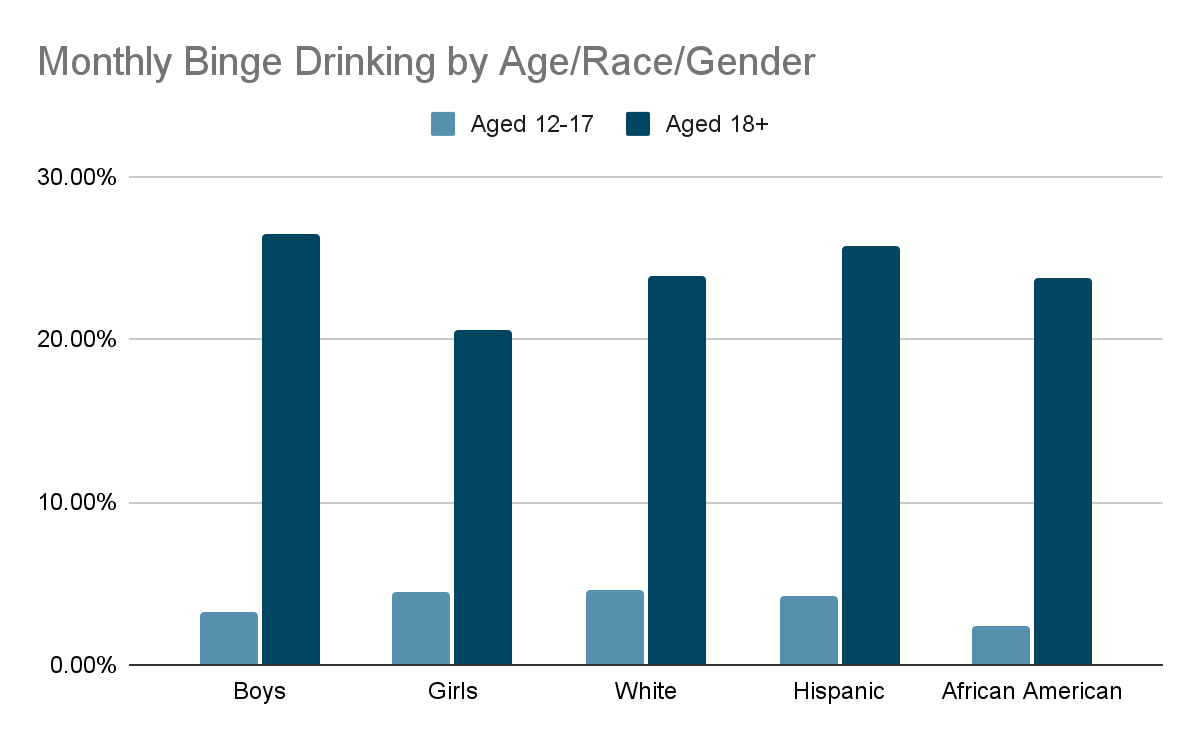
“Many people can recall stories from college or social events where drinking got out of hand. What might seem like a funny memory at the time could actually reflect risky behavior with serious consequences.”
You may have heard stories, maybe even told a few yourself about nights of heavy drinking or blacking out. While these experiences are often shared casually or even laughed off, they can involve serious risks that are too often overlooked.
When does drinking to that extent become a “problem?” Is this simply a “phase” that someone outgrows? Even if it is a phase, does that make it somehow safer or lower the risks?
Drinking to an extent, such as the story above, is known as binge drinking. Here in Texas, 1 in 6 adults report that they binge drink at least once a month. Our team at San Antonio Recovery Center has seen the lasting impact that binge drinking has on families and individuals alike. Today, we’re going to highlight the dangers of binge drinking and answer many of the common questions we get about how it works and what it does to the body.
Binge drinking is defined by the CDC as consuming a large amount of alcohol in a short period, typically four or more drinks for women and five or more for men in about two hours. This pattern raises blood alcohol levels quickly, often leading to impaired judgment and health risks even if a person doesn’t feel drunk.
When we measure the threshold for binge drinking, there is a different number used for women and men. This is not because of a presumed “tolerance” difference between the two, but rather because of a biological factor that varies depending on your assigned sex. Alcohol is processed through the body utilizing specific enzymes, and men, on average, produce a higher number of these enzymes than women.
Here are the most common examples of what constitutes a single “drink:”
| Beverage | ABV (%) | Volume (oz) |
|---|---|---|
| Beer | 5 | 12.0 |
| Malt liquor | 7 | 8.0 |
| Wine | 12 | 5.0 |
| Distilled spirits | 40 | 1.5 |
Even if someone isn’t “acting drunk,” they’re still binge drinking once they hit that number.
You can probably already guess a few of the things that make binge drinking dangerous. It’s the stuff they taught you about in DARE classes in high school, or the horror stories you saw on the news. People can make reckless decisions when under the influence of alcohol, and that can lead to people being seriously injured or killed.
But it goes beyond that. Even if someone takes all the precautions in the world – having a designated driver, setting a limit for themselves, and having a plan on where to sleep that night – that doesn’t mean what they did was risk-free.
This knowledge is still new to a lot of people. It wasn’t until 2023 that the World Health Organization announced that “no level of alcohol consumption is risk-free.” The CDC now states that “even moderate drinking may increase your risk of death and other alcohol-related harms, compared to not drinking.”
Alcohol is not natural to the body. It is a carcinogenic substance, and it is toxic to the systems that process it and come into contact with it. The more you drink, whether in one sitting or across your lifetime, the higher your risk of developing a wide range of alcohol-related health conditions.

When we consume alcohol, it doesn’t just go through our digestive tract and out the other side. No, it has to go through several steps to make it fully through the body.
Any toxin that we put into our body is processed through the liver, including alcohol. The liver has a set capacity for how much it can process at any given moment. No matter your “tolerance,” this will not change. So, when you introduce more alcohol into the body than it can manage, the alcohol starts to get into your bloodstream and affect other organs such as the heart and brain. Let’s take a closer look at the short and long-term effects that can come from this.
Short-term risks and side effects refer specifically to those that occur during and shortly after alcohol consumption. These are not effects that last for days or months afterward, nor are they ones that can pop up down the road, even outside of times you’ve been drinking.
The primary short-term risks associated with binge drinking stem from the decisions made while under the influence. The most common risks include:
As you may already know, the more often someone binge drinks, the higher the odds of developing an alcohol use disorder. They also inherently have a higher chance of experiencing any of the short-term side effects during their binge drinking sessions.
Not only does an alcohol use disorder come with additional side effects, but there are inherent risks to your body when you consistently expose it to large quantities of alcohol.
Here are a few of the most common conditions that come from long-term binge drinking:
Binge drinking occurs across all ages, races, financial brackets, and more, but are some groups more likely to binge drink than others?
According to the National Institute on Alcohol Abuse and Alcoholism, binge drinking rates in the United States are fairly similar across different racial identities and age groups. Other factors such as untreated mental health, big life changes, and peer pressure are more likely to play a role in someone binge drinking over their demographic.

As we mentioned earlier, there are additional side effects that can occur when someone develops an alcohol use disorder beyond the physical damage that happens with consistent drinking.
When does binge drinking become an alcohol use disorder? Is it easy to spot?
If you’re concerned that binge drinking may be turning into something more serious, consider these 9 questions. They’re commonly used by professionals to help identify alcohol use disorder (AUD):
While we do not encourage you to self-diagnose, if you or a loved one answers yes to some of these questions, it’s time to consider seeking treatment.

Finding healing away from binge drinking and alcoholism doesn’t have to be hard. Right here in San Antonio, there are high-quality alcohol detox centers that are committed to helping you achieve long-term healing and success.
No matter your history with alcohol use, recovery, untreated mental health, and more, San Antonio Recovery Center’s team is here for you. Our team has been through it themselves and truly understands what recovery is all about. With the largest alumni network in the city, we have a solid record of setting people up for success. Give us a call today at 866-957-7885 to get started.
Strength. Acceptance. Recovery. Community.
contact us now!
